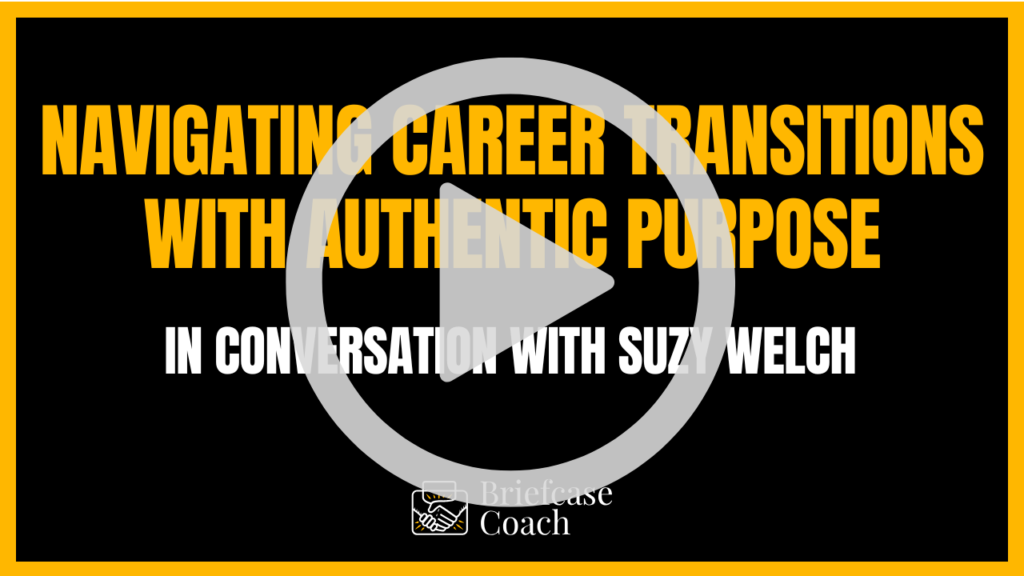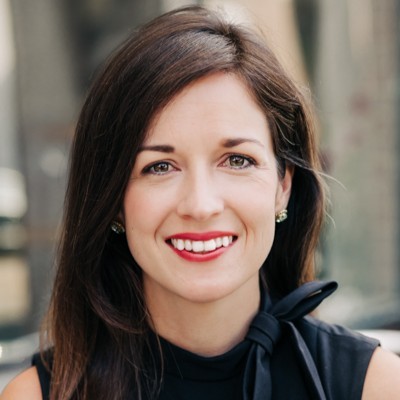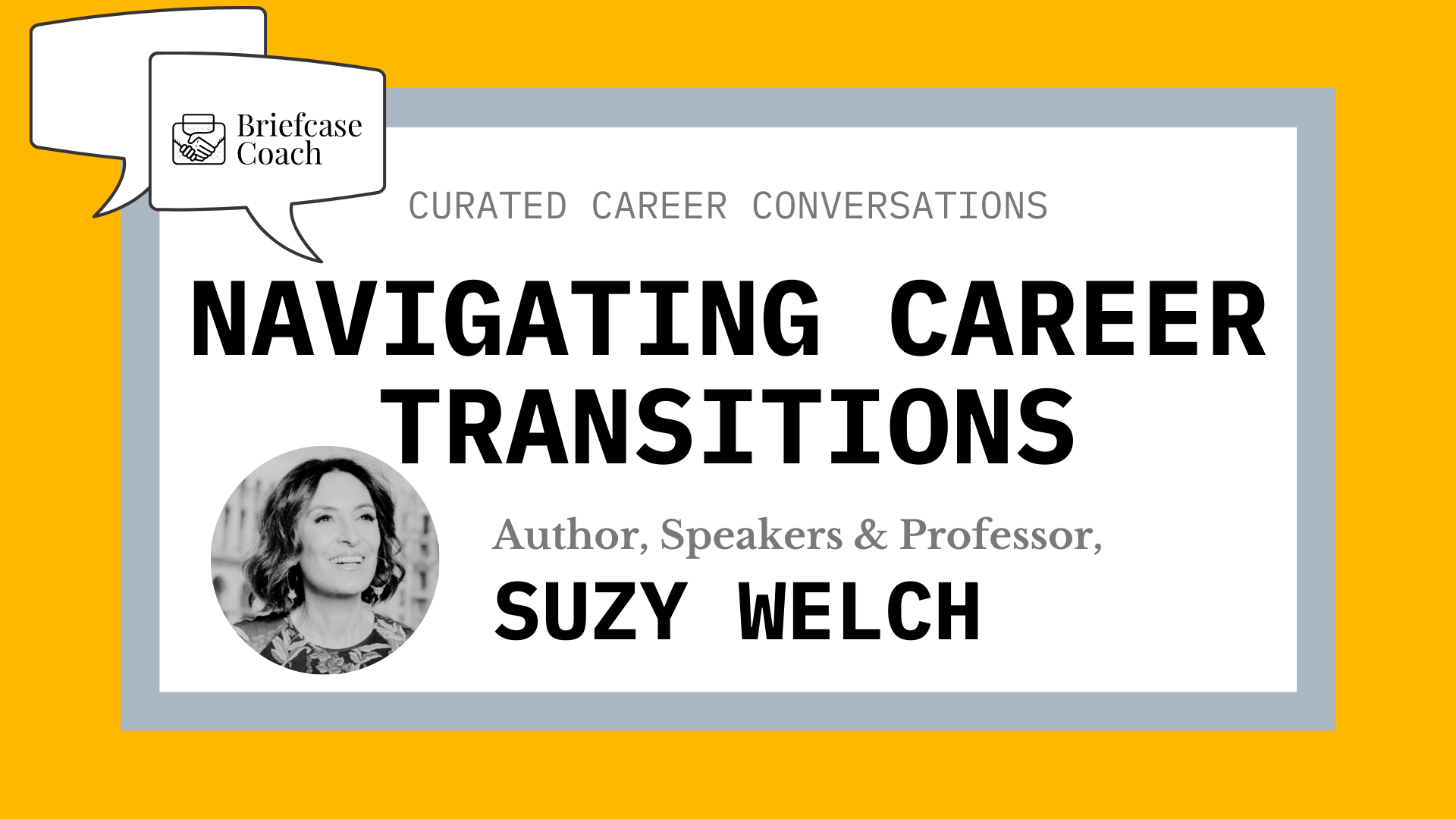
Navigating Career Transitions with Authentic Purpose: A Curated Career Conversation with Suzy Welch
As the founder of Briefcase Coach, one of the world’s top executive career branding firms, I am always eager to bring fresh perspectives to professionals navigating career growth and leadership. Today, I am absolutely thrilled to talk with Suzy Welch—renowned author, speaker, and television commentator—whose insights on careers and leadership have guided countless individuals through the complexities of the modern professional world.
In our conversation, Suzy shares valuable insights on navigating career transitions by embracing self-discovery and understanding your core values, aptitudes, and interests. She emphasizes the importance of intentionality in career growth and making strategic pivots, especially during uncertain times and encourages professionals to engage in meaningful connections and continuous learning, ultimately leading to a more authentic and fulfilling career path.
Prefer to watch? See the end of the article for a link to the video recording of our interview.
The Power of Career Pivots: Embracing the Squiggly Path to Success
Sarah Johnston (SJ): Suzy, as a renowned author, speaker and television commenter, your insights on careers and leadership have guided countless professionals. Given your impressive journey, I’m curious – and this is a question I ask all my clients: did you intentionally choose your career path, or would you say it evolved more serendipitously over time?
Suzy Welch (Suzy): Who in the history of humankind has chosen their career path? Maybe one person. I used to be the Career Columnist for O Magazine, and I flying out to give a speech and sat next to a woman on a plane and I made a mention to her that very few careers are linear, and she said claim, very directly, “mine has”. I joked, “Well, I’m glad I met the one person.” Of course, some fields—like law or medicine—have clear trajectories. But in business and enterprise, career paths rarely follow a straight line.
My own journey only makes sense in the rearview mirror, with seemingly disparate experiences converging over time. Now, in full circle, I teach a class at NYU Business School Becoming You, Crafting the Authentic Life You Want and Need. The course is about crafting an authentic life and career. I always show my students a slide of squiggly lines, reminding them that while detours are inevitable, intentionality can make them shorter—and a little less boneheaded.
SJ: I feel like we as a culture are just starting to talk about and embrace career pivots and transitions. I’m a millennial, and when I think about my parents and my grandparents, they had the same employer for most of their careers. Juxtaposing that to today, the average person holds around 12 jobs in their lifetime. When did you start seeing this transition or this shift of holding more roles during the course of a career?
Suzy: I think it started 10 years ago, and now it’s in full form. I’m surprised 12 is the number—I’d expect closer to 20. And it’s only going to continue to rise. Research suggests that in the next decade, 85% of us will be gig workers, piecing together work instead of committing to a single company long-term. There will be exceptions—I hope my own company, Becoming You, is one—but we must constantly upgrade our skills and take full control of our careers. No one else can captain the ship of your career.
Upwork reports that 64 million Americans freelanced in 2023
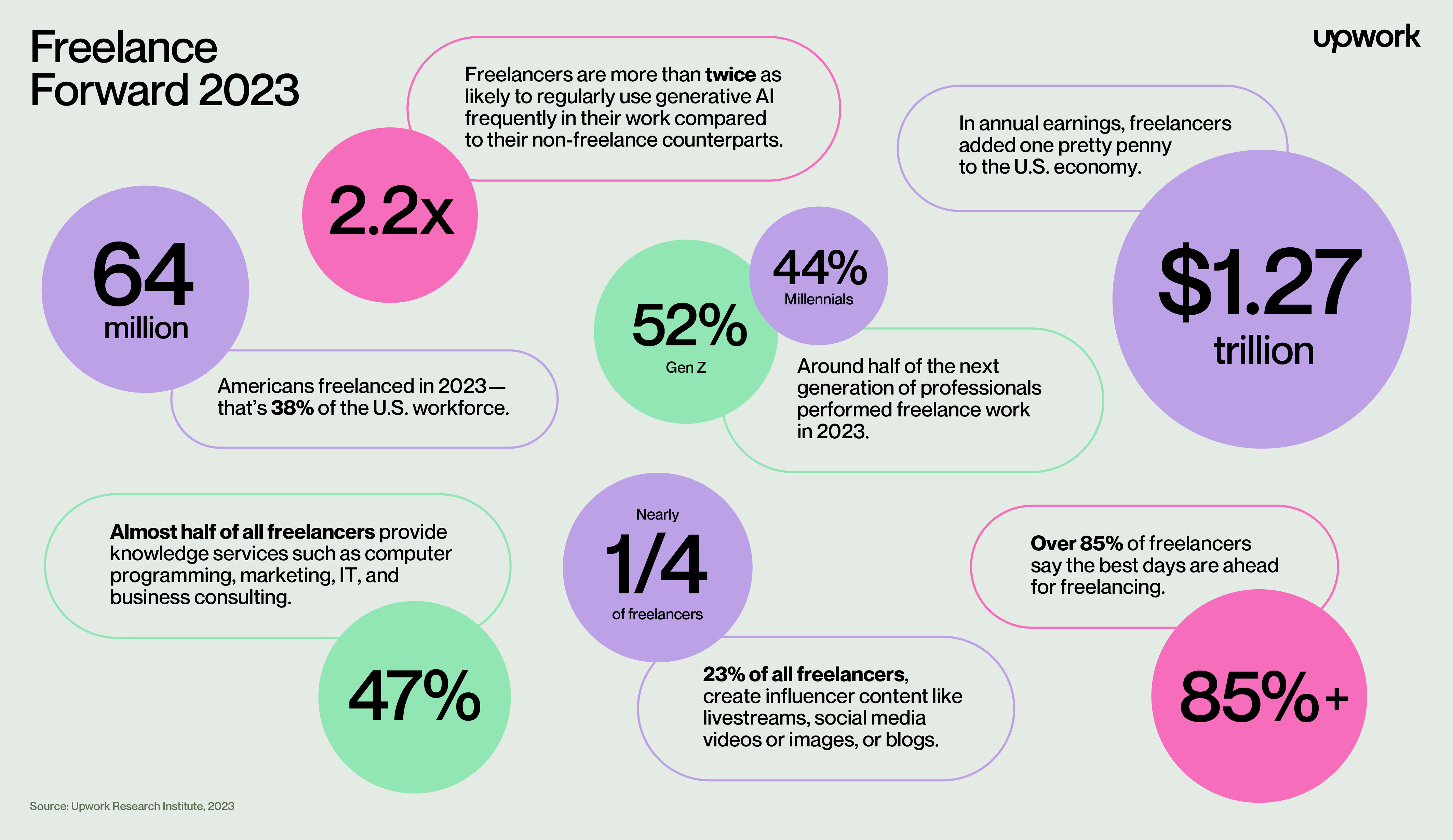
Upwork’s 2023 data reveals a dramatic surge in freelance work, now comprising 38% of the U.S. workforce. This growth, fueled by Millennials and Gen Z, highlights the sector’s significant economic impact and its rapid adoption of technologies like generative AI. Freelancers are not only contributing substantially to the economy but also leading in the creation of digital content and knowledge-based services, signaling a profound shift towards independent, tech-savvy careers.
Being at the helm of your own career and the trajectory that it takes requires knowing your values, aptitudes, and interests. Too many people want to write their resumes and plan their careers without first excavating that data. But you can’t make up your values as you go—they’re already in you. Identifying them is gold.
SJ: You are so right. So many people skip the self-evaluation step of the job search process and the search to know your options. People just want to launch straight into the job search and start applying for jobs.
Suzy: I’m completely with you on this. I tell my students all the time, “You’re not going to like this, but you have to get existential before you get tactical.” My class is all about that—helping you figure out the big questions so you can take action. You have to know your purpose, at least generally, before you start plotting your way to it. That journey could take 20 years—it took me 60—but eventually, you get there.
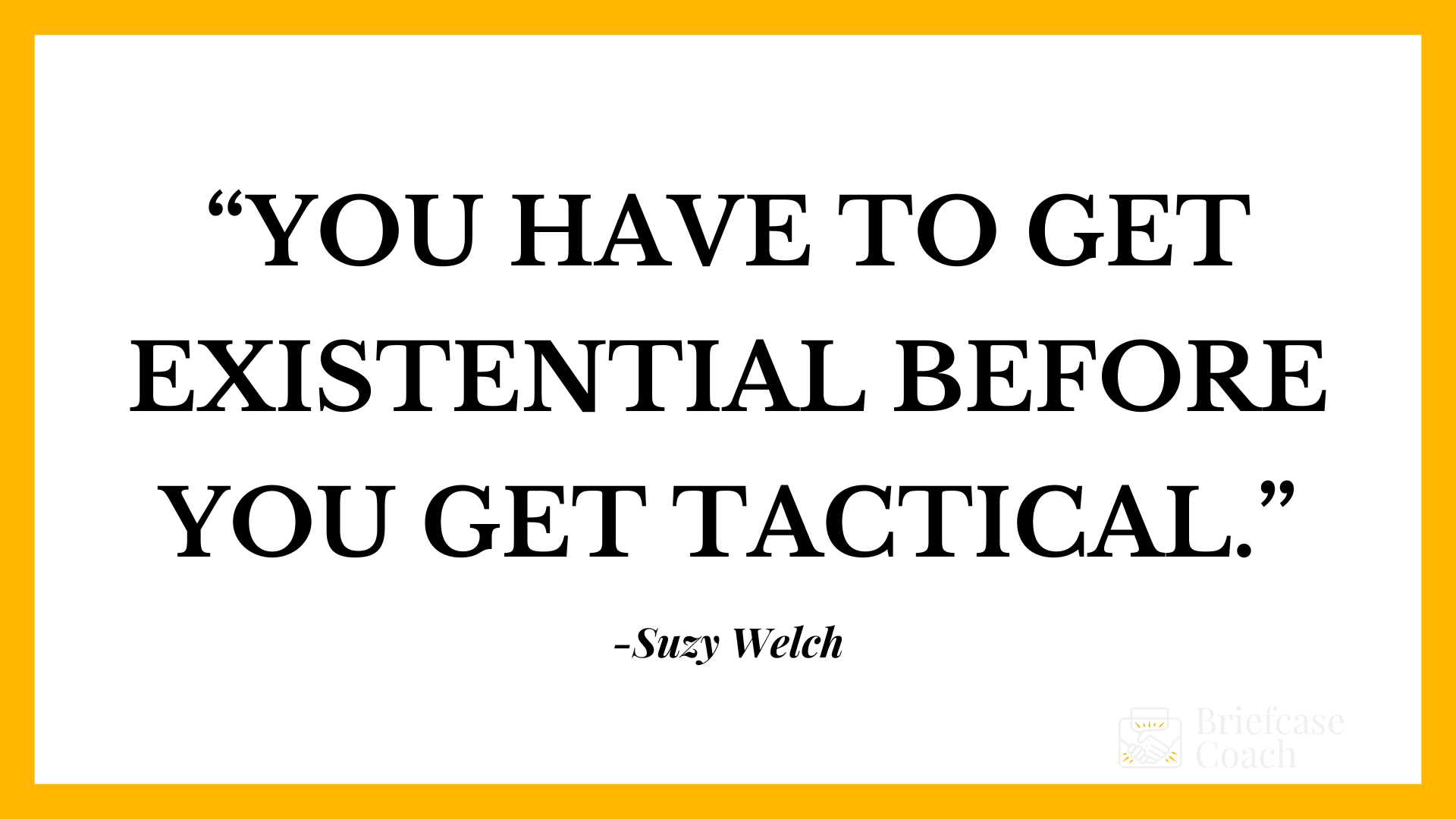
My daughter, at 30, is already living her purpose. She had someone in her face from the beginning, pushing her to think existentially before getting tactical. And it worked. I’ve seen it with my students too—you don’t have to wait until later in life. You can’t just look for a job and try to fit yourself into it. You have to know who you are first.
Living by Design: The Journey of Career Transitions and Self-Discovery
SJ: Suzy, I’m curious, was there a pivotal moment or experience that shaped your perspective on career transitions and self discovery?
Suzy: I think there have been so many pivotal moments. I mean, I think that my whole life has been one. You know, you’re learning and learning and learning. And I think, you know, probably the first pivotal moment, the first pivotal moment, was that I happened into journalism.
When I was at Harvard, I worked at the student newspaper, and two recruiters came from the Miami Herald looking for reporters, and I thought, Sure, I’ll go to Miami. It was a very exciting city to go to in 1981, as you can imagine, it was the middle of the Miami Vice era. I got there, and pretty quickly, I was quite good at the job. I was a good writer, and I am an extrovert, so people didn’t mind talking to me. But pretty early on, there was sort of like a noise in my ear.
I didn’t have the words for it then, but I now know it was a values disconnect. Then the first kind of thing that dawned on me was, I think I have a disconnect with some of the sensibilities. I didn’t like asking vulnerable people tough questions, and I missed my family up north.
And then very serendipitously, I was reassigned to cover business, and suddenly I was hanging out with people who were leaders in business, and I was like, oh, here are my people.
I remember interviewing a young entrepreneur who said, If everything goes as planned, I’ll have 200 employees next year—I’ll be able to give 100 more people jobs. And when he said that, I thought, I want that. I want that feeling. I want to build something. And so this was a very pivotal moment to realize that there was a value in me about building and about growing, and it’s a value I call scope, which is how big a life you want? I wanted a life where I was helping.
Another pivotal moment came when I was covering business, and I was kind of bumping along, and I had an just enough self awareness to think I don’t understand business well enough. So I went back to business school, which was a scary, expensive thing to do, but I understood my weaknesses. I understood that I had to close that gap, and so I did that, and then I went into business, and I joined a firm that was fantastic, Bain and Company, but I ended up staying longer than I was comfortable with. I was learning so much and I knew I needed that.
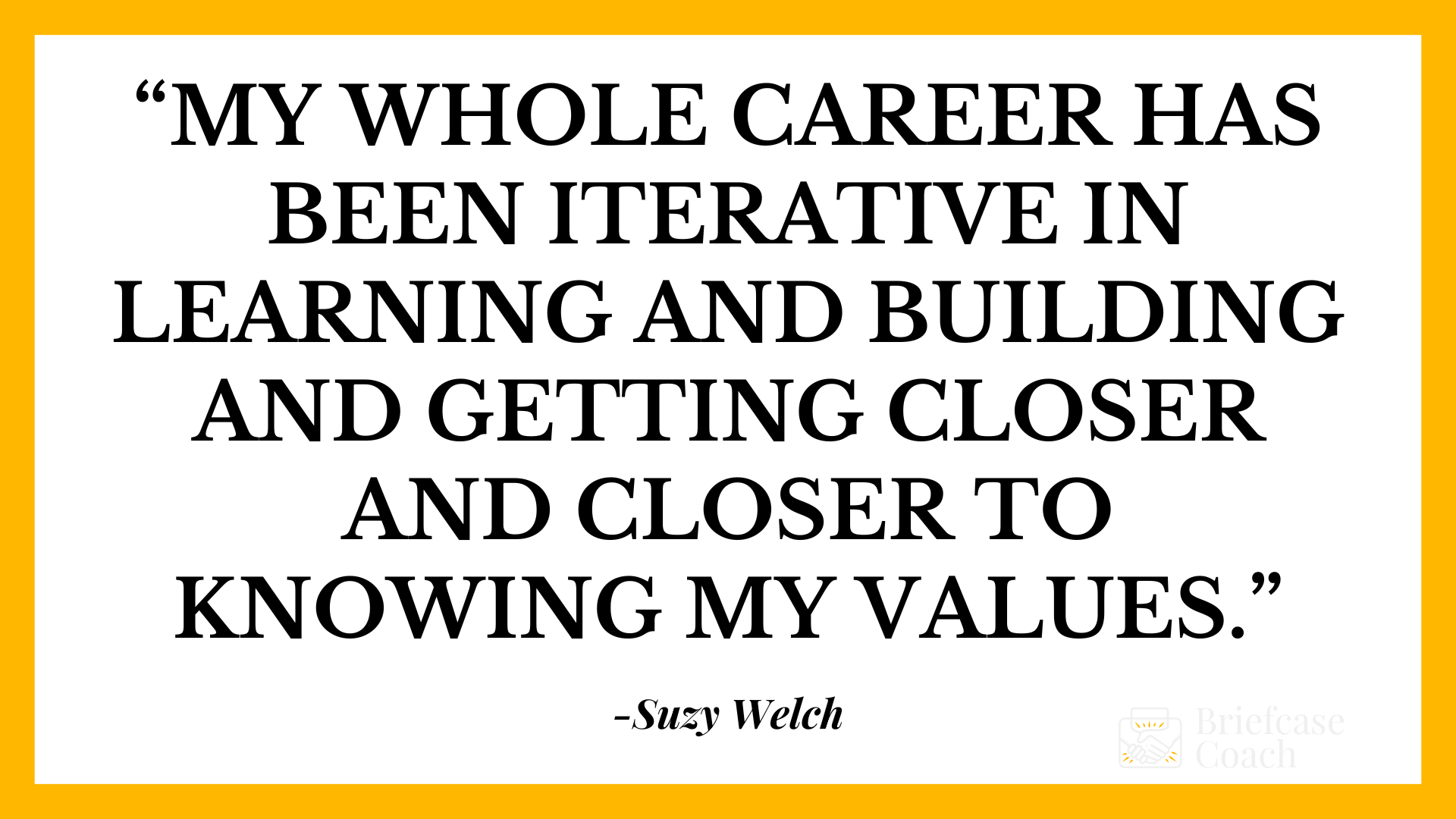
During that time, I had four children, which added another value, the value of family centrism. I needed to be more with my children, so I took a job I didn’t have to travel. So, my whole career has been iterative in learning and building and getting closer and closer to knowing my values, getting closer and closer to knowing my aptitudes and what my interests were.
A key strength of my methodology, and I suspect yours as well, lies in its ability to accelerate self-discovery. You don’t need a lifetime to understand your values, aptitudes, and interests. They reside within you, ready to be uncovered. They are in you, you have to go find them.
SJ: You said something so clearly that I tell people all the time, and I’m sure you do with your students as well, that your career is a journey, and it’s not a one stop destination.
Suzy: No, it’s not. But I do want to push back slightly, and I’m sure you will agree with me—it can happen with fewer detours. It is a journey, but it can be a smoother one if we put some intentionality behind it. Because really, there are three ways to live.
It is a journey, but it can be smoother if we put some intentionality behind it.
First, by default—where we just sort of let life happen to us, and we sort of take the job that’s available. Maybe your neighbor’s uncle has an opening, and you go for it, even if it’s not the right fit. And you know, 90% of the time, that’s how we live, because we’re human beings, and life is hard enough, and we’re just very reactive. But after a while, that gets pretty old.
The second way is by deliberation—which is when we start to sprinkle some intentionality on things. You start questioning: Is this really right for me? Does this align with my aptitudes? I’ve tried this before, and it didn’t work. This is a step forward.
But the real goal is to live by design—to truly know your purpose and align your choices with it. That’s very, very hard, but that’s the goal. That’s the really enriching, flourishing career in life is when you’re living by design, where you’re actually know your purpose. It takes longer than we’d like but you can get there. And you can get there sooner if you commit to it.
Becoming You: Crafting Your Authentic Career and Staying Relevant
SJ: I am just so excited about your book launching in May, Becoming You, the proven method for crafting your authentic life and career, which will resonate with so many job seekers. Can you tell our listeners what they can expect from your book?
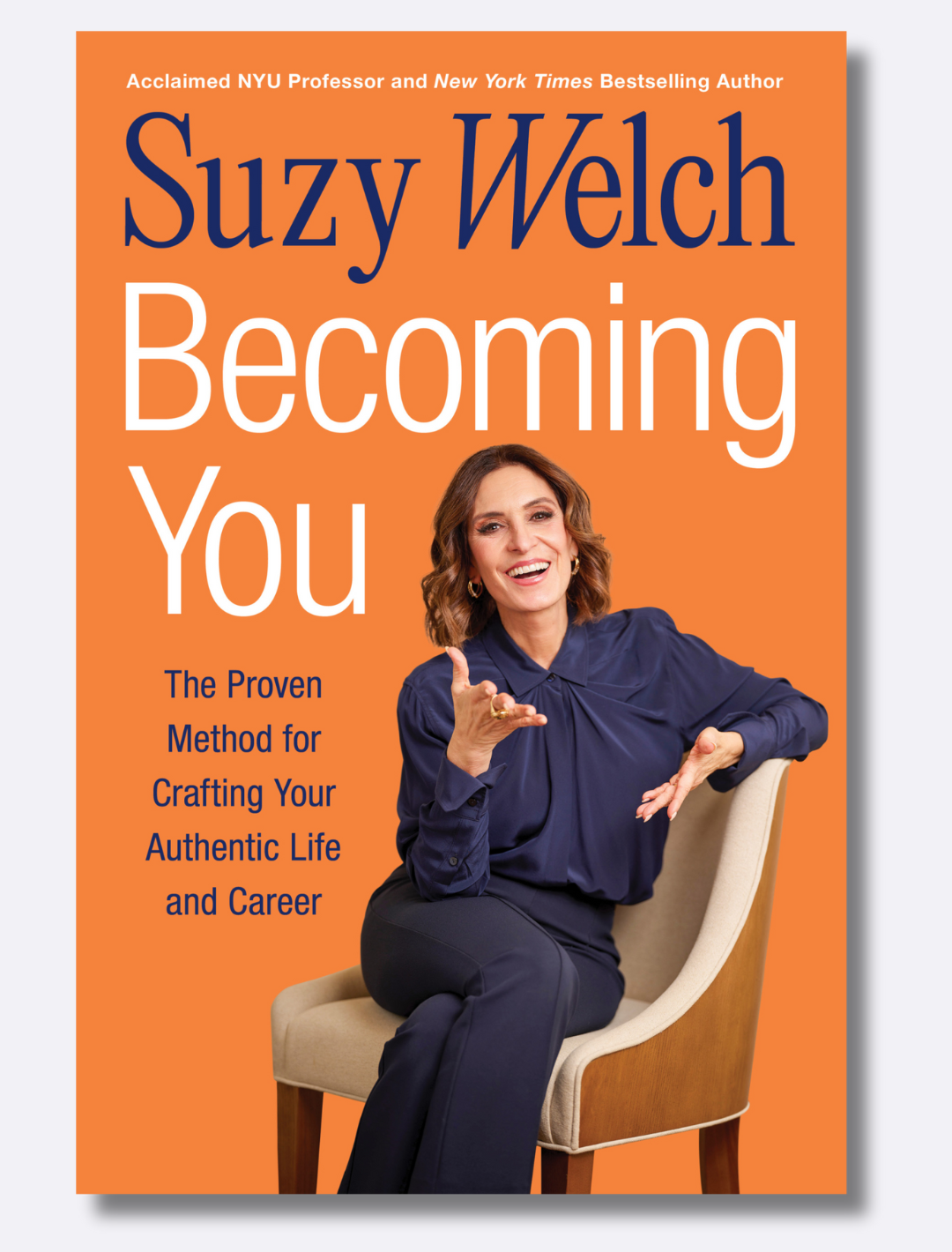
Suzy: My NYU class is full of students who are about to begin their job search, and they come to my class because this is the existential work that you need to do before the tactical work, and it helps you figure out your purpose. This is not some “woo-woo” stuff—because when you’re looking for job, it’s serious business. In a job search, there’s no time for abstract thinking; it’s about getting down to brass tacks.
The book does three things:
First, it helps you identify your values. There’s a bunch of activities and exercises, and there’s a digital tool. You’re going to come out of it with a list of your values, and they’re not going to be vague. There are 15 human values, and you’re going to find out the specific rank order of your values, of what’s important to you.
The second part of the book helps you understand your aptitudes—what you’re actually good at. It’s not about making sense of it or guessing. Through exercises and tests, you’ll create a list of your capabilities. This is some of the most important information we get, because here’s the thing, we like to believe that our personality is the words we use to describe ourselves: “I’m generous,” “I’m kind,” “I’m a good listener,” “I’m dedicated,” right? And we like to believe that, but I’m not sure that it’s true of everybody. We say a lot of things about ourselves but what we need to find out is how people are experiencing us. That’s your real personality, those are your real aptitudes, that’s how the world experiences you.
We need to know how others perceive us to truly understand our strengths and weaknesses. That’s why I created PI 360, a tool that’s inexpensive, quick to use, and provides valuable feedback on how people see you. Getting this data is invaluable—it helps you determine what kind of career will align with how the world experiences you. Sometimes this feedback is uplifting and validating; other times, it can be eye-opening. You might think you’re good with people, but the world might actually see you as more focused on ideas. So that’s the second part of the book. It helps you figure out what your actual abilities are. Capabilities are your aptitudes.
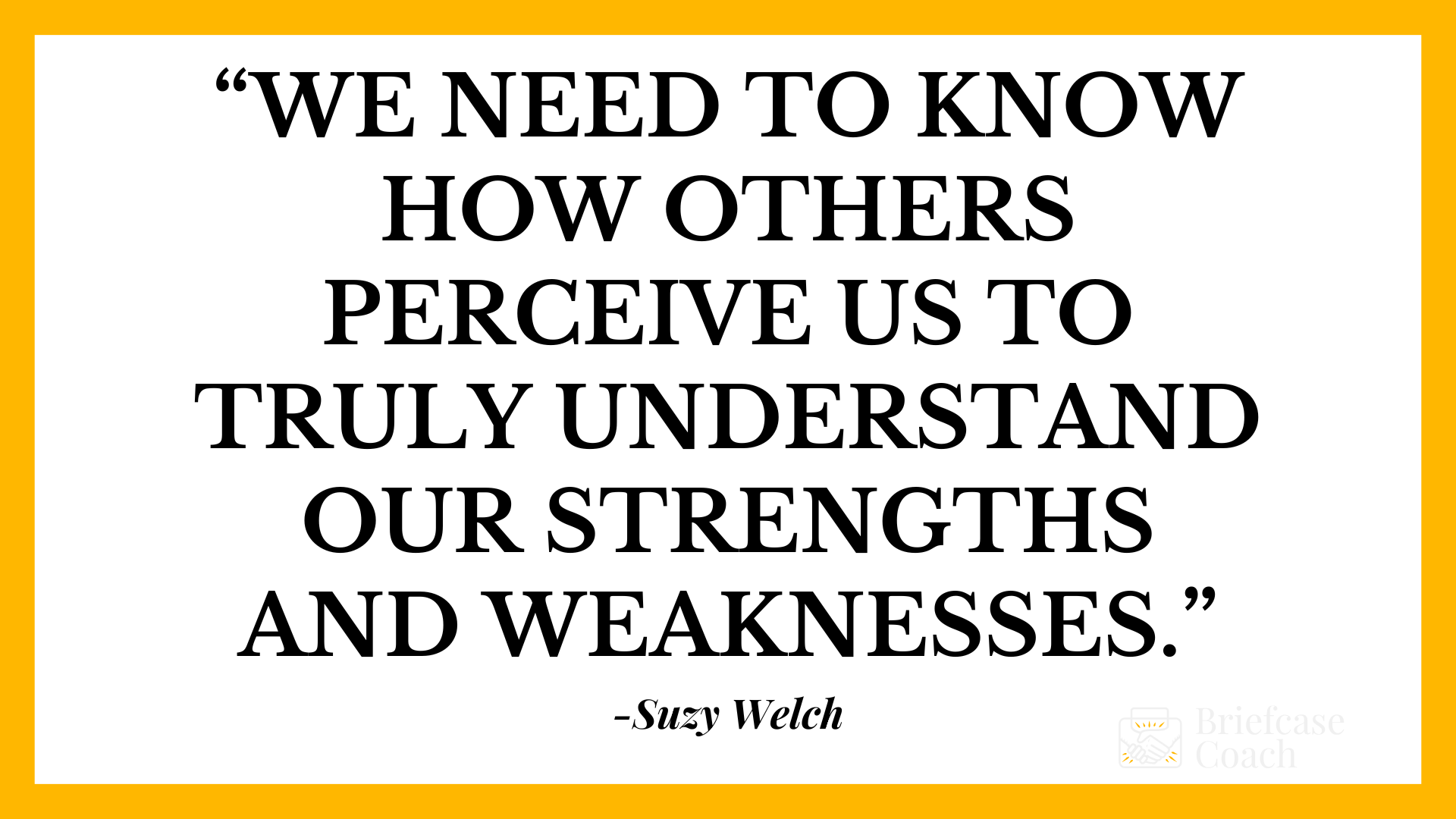
And the final part is it, it helps you figure out what your interests are. Now, some people already know this, but other people know their values and they know their aptitudes, but they don’t actually know their interests. So the book has a bunch of techniques and tools that help you pinpoint what industry you should go in and what kind of work you should do. After that, it’s on you to synthesize that, but usually the answer to what you should do just pops. I mean it. Once you have all that data, it’s like, “Oh, okay, I get it. I figured it out.”
SJ: So as a professor yourself, I’m sure you appreciate the need for continuous learning. What advice do you have for executives on staying relevant and acquiring new skills, or industry skills?
Suzy: I say it again and again: your currency is your currency. How valuable you are is how up to date you are. You cannot, in this day and age, not know about geopolitical events, about trends, about people in your industry, about what’s going on. You’re of no use to a company if you’re not current.
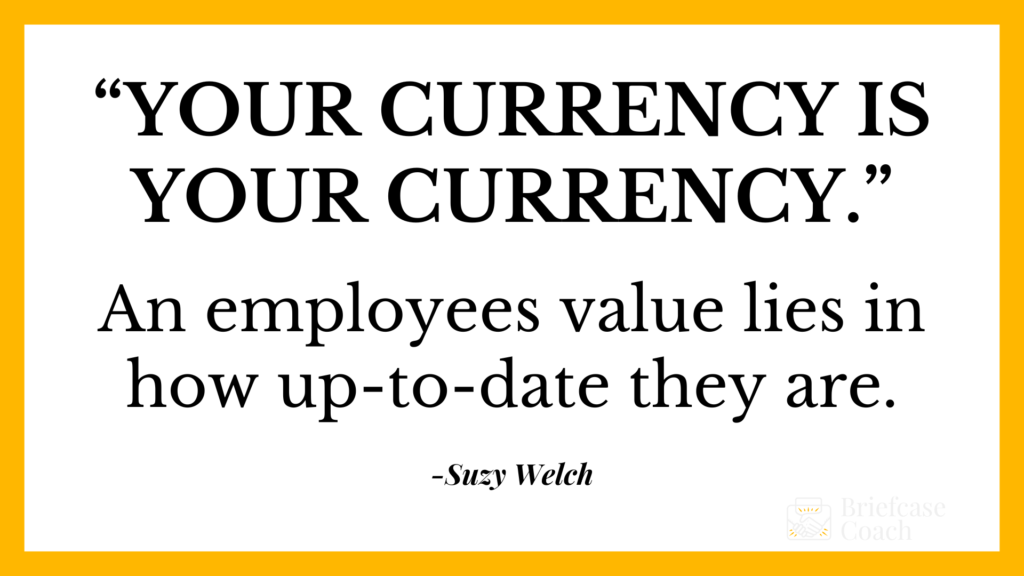
There’s a lot of news coming at us all the time, and sometimes we don’t want to read it, we don’t want to know about it. And at a certain point, we give up and say “I’m just going to doom scroll for a while because I can’t take it.” But that’s not optional anymore. You have to get into the mix and be informed.
I like to ask my students to compile what I call a watch list, is a curated list of sources and people to follow—specific journals to read, key industry leaders to track, and, critically, at least three people you disagree with. It’s essential to understand perspectives outside your own and avoid living in an echo chamber. It’s a discipline. It doesn’t just happen. And it’s harder and harder to stay current, because there’s so many ways to do it. But it’s so important because you really can’t lose your currency, your worth to your organization.
SJ: If you have a certain amount of money to invest every year, would you say conference or classes?
Suzy: They’re both really good—truly. I think classes are very important. They can be transformative.That’s the word I hear most often from people who I’ve taught: transformative. They’ll tell me, I really needed this, and I love hearing that.
But I also go to a lot of conferences. I go to academic conferences. I’m always learning something. Sometimes, those academic conferences can be a bit obscure, but then, I might catch a glimmer of an idea that sticks with me. Then, two years later, I realized, Oh yeah, I heard about this back then. So I do think it’s good to get out to conferences.
So between the two, I’d split the investment.
Strategic Career Pivots: Balancing Values, Risk, and Opportunity
SJ: Given today’s dynamic job market, what key factors should executives consider when deciding if and when to make a significant career pivot, especially regarding potential trade offs in the role, including compensation and overall impact?
Suzy: It’s circumstantial to you—it’s about your own values. Because not everybody has the same value on affluence. One of the hardest things I discuss with my students is money. Before I developed the Values Bridge, the tool I use now in my NYU Stern School of Business intensive, Becoming You, I would ask both my private clients—mostly executives—and my students, including executive MBAs, how much money really matters to them. And then everybody would always say the same thing: I want financial security.
And as you start to unpack it, some people just want to be able to have one year of money in case something terrible happens. And other people want a helipad for each child. And they both call it financial security. So you have to have a very candid conversation with yourself about how much is enough.
Behavioral economics will tell us that we will make decisions based on money whether we value money or not. So it’s critical to determine how much money actually matters to you. This isn’t easy but once you figure it out, you can start thinking about a career pivot. If affluence is actually not a huge value for you, if you just want enough to sort of maybe keep your current lifestyle, or you could downsize or simplify, then you have a lot more latitude in a pivot.
There is one value that people often discount in a pivot decision, and that’s location. You have to understand how much latitude you have and would give yourself around where you want to live. You can pivot really wide and do unbelievable things if you are not saying “I gotta stay in one place.” But you gotta know that about yourself.
SJ: What do you recommend for someone who’s transitioning from one career to another now that values, attitudes and interests are known? Once you have the data and the skills, what do you think should happen next in terms of making that transition or that pivot?
Suzy: First, talk to the people in the industry or your target role. If you know where you want to go and have the data to support it, I would test it. Find some of those people and talk to them and make sure that your assumptions are correct about how you think it’s going to play out. And then you finally have to take the swing.
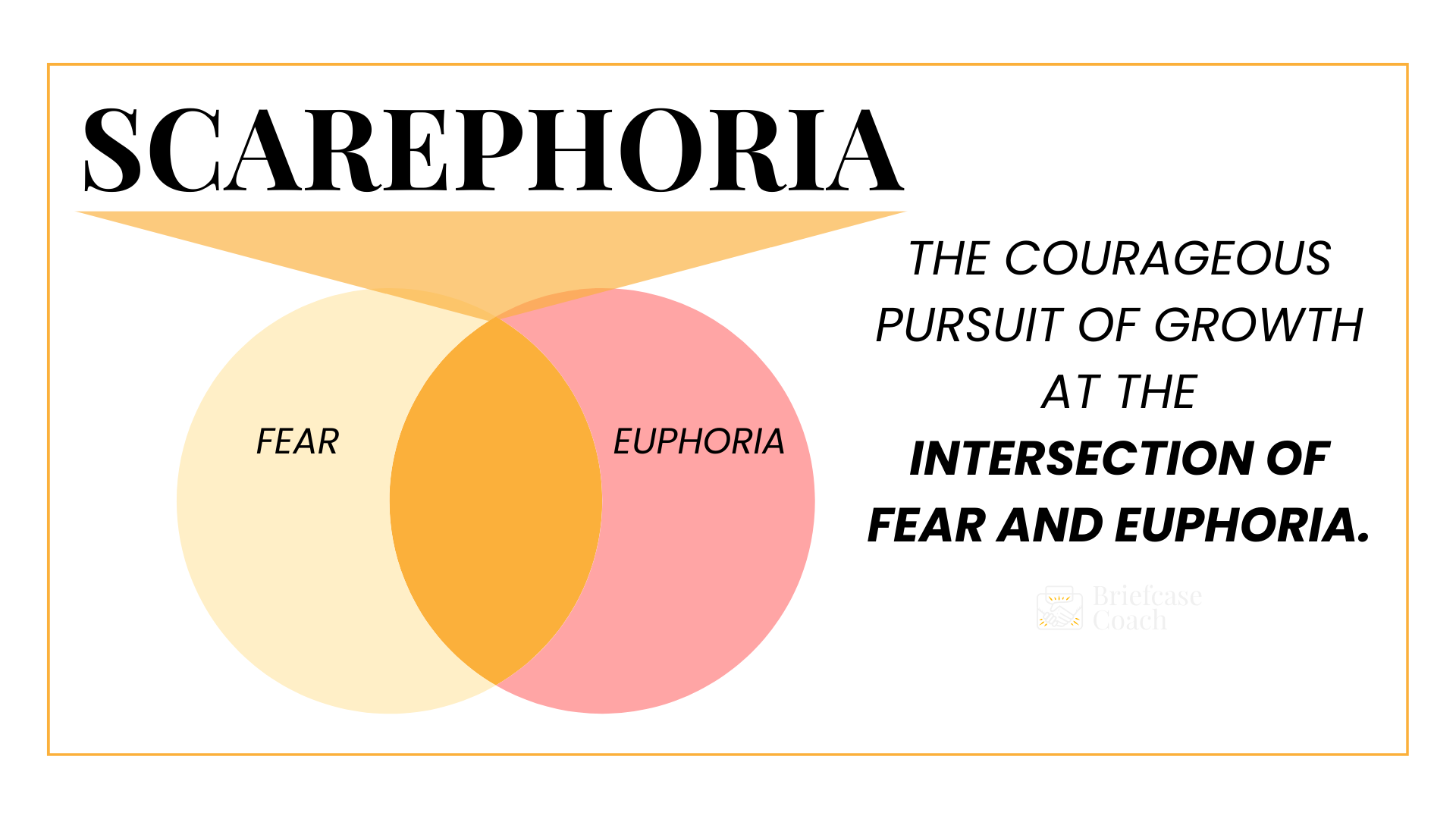
You’ve got to have courage to step into what I call scarephoria—that mix of fear and euphoria where real growth happens. It doesn’t occur when we’re feeling terrified, scared, and it doesn’t occur when we’re feeling just euphoric. It happens at that moment where we’re willing to step into our fear and and take the swing.
SJ: A lot of people are making comments about about the job market right now. It’s a frozen market and the hiring is just not what it was two years ago for this white collar environment. What kind of advice do you have in terms of grit or perseverance for making that change that someone in their heart knows that they’re ready to make that they just may not be able to make it right now?
Suzy: It’s a hard market. There’s a lot of layoffs and and there’s a little bit of breath holding, so you may know what the pivot is going to be, but you may need to hunker down for a little bit. I’m not going to say for too long.
Sometimes you just have to go for it. In any environment, there are good companies that are always growing. But you may need to hunker down for a moment, because there’s just not enough certainty to make a leap.
I do think things are going to sort themselves out soon, maybe within six months. In the meantime, I would say to use this time to actually continue to paint your self portrait. The better you know yourself in terms of your values and your aptitudes and your interests, the more you’re going to be able to fine tune. You can also position yourself more effectively within your current organization—approaching leadership and saying, I’ve realized this about myself—maybe I could take on X, Y, or Z. This kind of strategic adaptation can help you thrive even before making a full pivot.
Either way, at a certain point, you’re going to have to start putting your toe in the water. You don’t want to delay too long. And you can make micro pivots too. Without making a full pivot, you can start doing some side projects that are in alignment with that target role to get yourself ready so that when hiring does change and picks up, you are the first candidate that people think about.
A big thank you to Suzy for sharing her wisdom and advice. Be sure to check out her upcoming book, Becoming You, which is packed with tools and strategies to guide you through a journey of self-discovery and professional fulfillment.
I hope you’re feeling empowered and inspired to take charge of your career journey. Whether you’re considering a career pivot, refining your current role, or simply stepping into the next phase of growth, remember: it all starts with clarity on your values, aptitudes, and interests. By embracing intentionality, testing assumptions, and having the courage to move through the “scarephoria,” you can navigate your path with purpose.
Now, your challenge: take a moment today to reflect on your own career path. What small or big pivots can you make to align more closely with your values and passions? As Suzy emphasizes, the key to growth is understanding who you truly are and staying open to continuous evolution. It’s not just about external connections, but about delving deeper into your own values, strengths, and goals. Take time to reflect on what truly drives you and how you can keep growing in your career and personal life
Watch the video recording of Sarah Johnston and Suzy Welch’s interview and join in the conversation on LinkedIn. Click the video below.
